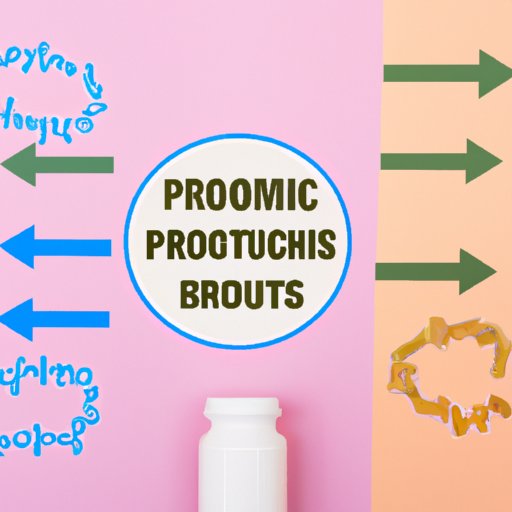
I. Introduction
When it comes to maintaining gut health, you may have come across the terms “prebiotics” and “probiotics” before. While these two supplements are often mentioned separately, did you know that they can work together to improve your digestive health? In this article, we’ll explore the benefits of taking prebiotics and probiotics together, and how this combination can maximize the health of your gut.
II. The Difference Between Prebiotics and Probiotics
First, let’s define prebiotics and probiotics. Prebiotics are types of fiber that the human body cannot digest, but are essential for the growth and activity of beneficial bacteria in the gut. Probiotics, on the other hand, are live microorganisms that can provide a range of health benefits when consumed in adequate amounts.
Both prebiotics and probiotics work to improve gut health, but in slightly different ways. Prebiotics act as food for probiotics, promoting the growth of beneficial bacteria in the gut. Probiotics, on the other hand, actively introduce beneficial bacteria into the gut.
III. How Prebiotics and Probiotics Work Together
The relationship between prebiotics and probiotics is known as a symbiotic relationship. This means that the two supplements work together to support the health of the gut. By taking prebiotics and probiotics together, you can help to encourage the growth and activity of beneficial bacteria in the gut.
To maximize the benefits of taking prebiotics and probiotics together, it’s important to choose supplements that contain a variety of strains of probiotics and different types of prebiotic fibers. This can allow for a greater diversity of bacteria and fiber in the gut, which can have a positive impact on overall gut health.
IV. Maximizing Gut Health with Prebiotics and Probiotics
A healthy gut is essential for overall well-being, and taking prebiotics and probiotics together can help to improve gut health. Research has shown that taking these supplements together can lead to a range of health benefits, including improved digestion, reduced inflammation, and a stronger immune system.
One study found that taking a combination of prebiotics and probiotics led to a reduction in harmful bacteria in the gut, while increasing the number of beneficial bacteria. This can lead to an overall improvement in gut health and digestion.
V. The Do’s and Don’ts of Taking Prebiotics and Probiotics Together
While taking prebiotics and probiotics together can be beneficial, there are some things to keep in mind. For example, it’s important to choose supplements that are of high quality and contain a variety of strains of probiotics and different types of prebiotic fibers. Additionally, it’s important to start with a low dose of both supplements and gradually increase the dosage over time.
It’s also important to avoid taking prebiotics and probiotics with certain medications, as they may interact and cause negative side effects. If you experience any negative side effects, such as bloating or diarrhea, it’s important to speak with a healthcare professional.
VI. Are Probiotics and Prebiotics the Ultimate Duo for Gut Health?
When taken together, prebiotics and probiotics can be a powerful combination for improving gut health. Studies have shown that this combination can be particularly beneficial for individuals with certain gut-related conditions, such as irritable bowel syndrome (IBS) and inflammatory bowel disease (IBD).
Additionally, some research has suggested that taking prebiotics and probiotics together may have a positive impact on mental health and overall well-being.
VII. Creating a Balanced Microbiome with Prebiotics and Probiotics
The gut microbiome refers to the collection of bacteria and other microorganisms that live in the gut. A balanced microbiome is important for overall well-being, as it can impact everything from digestion to mental health.
Taking prebiotics and probiotics together can help to create a balanced microbiome by increasing the number of beneficial bacteria in the gut. This can help to reduce inflammation and promote healthy digestion.
VIII. Beyond the Basics: Advanced Strategies for Combining Prebiotics and Probiotics
If you’re already familiar with prebiotics and probiotics, there are some advanced strategies you can try to maximize the benefits of taking these supplements together. For example, you may want to consider adding fermented foods to your diet, as these can help to introduce even more beneficial bacteria into the gut.
Additionally, you may want to consider taking a digestive enzyme supplement to improve digestion and absorption of nutrients from food.
IX. Conclusion
While prebiotics and probiotics are often discussed separately, taking these supplements together can have a powerful impact on gut health. By working together to promote the growth and activity of beneficial bacteria in the gut, prebiotics and probiotics can improve digestion, reduce inflammation, and support overall well-being. If you’re interested in trying these supplements together, be sure to speak with a healthcare professional to develop a plan that’s right for you.




